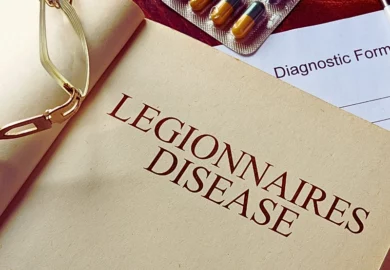When you trust a nursing home to care for your loved one, you expect them to provide safety—not life-threatening negligence. Yet far too often, Legionnaires’ disease in nursing homes harms vulnerable residents, putting their lives at risk. This severe form of pneumonia is caused by Legionella bacteria, and it thrives in poorly maintained water systems. For elderly residents with already fragile health, exposure can be deadly.
Table of Contents

If your loved one has been diagnosed with Legionnaires’ disease in a Chicago nursing home, you need to act fast. The law is clear: facilities have a duty to keep residents safe. When they cut corners, families have the right to demand accountability.
Call Ankin Law in Chicago today at 312-600-0000 for a free consultation. We fight for victims and families whose trust was betrayed by negligent nursing homes.
What Is Legionnaires’ Disease?
Legionnaires’ disease is a severe, and sometimes fatal, form of pneumonia. It develops after inhaling or aspirating small droplets of water contaminated with Legionella pneumophila bacteria. The disease attacks the lungs. Symptoms of Legionnaires’ disease include:
- High fever
- Cough
- Shortness of breath
- Chest pain
- Muscle aches
- Confusion
For elderly nursing home residents, weakened immune systems make fighting off Legionnaires’ disease nearly impossible. The CDC reports that 1 in 10 people infected with Legionnaires’ disease will die from the infection, and the risk is even higher among people over age 50 and those with chronic illnesses.
How Legionnaires’ Disease Spreads in Nursing Homes
Legionnaires’ disease spreads when people inhale small droplets of water containing Legionella bacteria. The bacteria thrive in warm-water environments, especially manmade systems. Large plumbing systems, shower heads, sink faucets, decorative fountains, and cooling towers can all spread the disease and are common in hospitals, hotels, and, of course, nursing homes.
In Illinois and across the U.S., outbreaks have been directly tied to:
- Inadequate water disinfection systems
- Poorly maintained hot tubs, showers, or fountains
- Old or corroded plumbing systems
- Failure to test and monitor water sources regularly
In Chicago nursing homes, residents shower every day, use nebulizers, or breathe air near cooling units that may be contaminated. These actions increase the chances of them inhaling the bacteria. Nursing homes may fail to have proper water management plans or to follow them, meaning that a Legionnaires’ disease outbreak can occur quickly.
- Inadequate disinfection protocols, especially neglecting chlorine treatments, allow bacteria to multiply.
- Poor maintenance of cooling towers and HVAC systems can spread contaminated water droplets.
- Stagnant water in rarely used pipes or tanks also fosters bacterial growth.
- Not conducting routine water testing also prevents early detection.
Chicago Nursing Homes and Legionnaires’ Disease
Chicago has not been immune to outbreaks. Illinois health officials have documented multiple cases in recent years, and nursing homes across Cook County remain on the radar of regulators. In fact, Illinois reported more than 700 cases of Legionnaires’ disease in 2022 alone, making it one of the top states for reported infections.
For families in Chicago, this statistic isn’t just a number—it’s a warning. Nursing homes must be held accountable when their failures contribute to preventable illnesses and deaths.
A Legionnaires’ disease outbreak at the Quincy Veterans Home in Illinois in 2015 took the lives of 11 people, and sickened at least 50 more. Despite numerous lawsuits and multi-million dollar rebuilding efforts, outbreaks continued to occur at the facility for years. The last recorded case at the original facility occurred in December 2019. Cases such as this one highlight the importance of strict preventive measures.
Who Is Most at Risk of Contracting Legionnaires’ Disease in Nursing Homes?
While anyone can get Legionnaires’ disease, nursing home residents are at the highest risk due to age, chronic health conditions, and shared living environments. The following groups are especially vulnerable:
- Adults over age 50
- Smokers or former smokers
- People with chronic lung disease
- People with weakened immune systems (including diabetes, kidney failure, and cancer patients)
- Nursing home residents with limited mobility
When these factors combine with negligent facility management, the danger skyrockets.
Signs a Nursing Home May Be Negligent
If your loved one contracted Legionnaires’ disease in a nursing home, negligence may have played a role. Warning signs of unsafe facilities and nursing home negligence include:
- Repeated plumbing issues or lack of hot water
- Lack of transparency about testing or infections
- Poor sanitation or general neglect in facility upkeep
- Prior citations for health and safety violations
Families should not assume illness was inevitable. With proper maintenance and monitoring, Legionnaires’ disease outbreaks in nursing homes are preventable.
Legal Rights for Victims of Legionnaires’ Disease in Nursing Homes
When a nursing home fails to prevent Legionella exposure, it can be held legally responsible for the harm caused. Illinois law requires facilities to provide safe living conditions. When they fail, victims and families may pursue claims for:
- Medical expenses
- Pain and suffering
- Wrongful death damages
- Punitive damages (in cases of egregious negligence)
While Legionnaires’ disease settlements can be substantial, these cases are not just about compensation. They are about justice, accountability, and sending a message to the nursing home industry: cutting corners will not be tolerated.
What To Do If Your Loved One Was Diagnosed With Legionnaires’ Disease in a Nursing Home
Time matters. If your loved one is diagnosed with Legionnaires’ disease in a nursing home:
- Seek immediate medical treatment
- Document all symptoms and hospitalizations
- Request the nursing home’s infection control records
- Contact a Chicago Legionnaires’ disease attorney as soon as possible
Do not let the facility downplay or cover up what happened.
Call Ankin Law today at 312-600-0000 for a free case evaluation.
FAQs About Legionnaires’ Disease in Nursing Homes
Can nursing homes prevent Legionnaires’ disease?
Yes. With regular testing, water treatment, and proper facility maintenance, outbreaks are preventable.
Is Legionnaires’ disease common in Illinois nursing homes?
Yes. Illinois consistently ranks among the states with the highest number of reported cases, making vigilance critical.
Can families sue a nursing home for Legionnaires’ disease?
Yes. If negligence caused your loved one’s illness or death, you may have a legal claim for damages.
Hold Chicago Nursing Homes Accountable for Legionnaires’ Disease
Legionnaires’ disease in nursing homes is a sign of systemic failure. Families should not have to wonder if their loved one is safe in a place meant to provide care. If your loved one has suffered from this preventable disease, it’s time to take action.
Call Ankin Law at 312-600-0000 or visit our Chicago law office to schedule your free consult.ll compensation, investigate the nursing home’s actions, and consult with medical experts. Contact us today.




